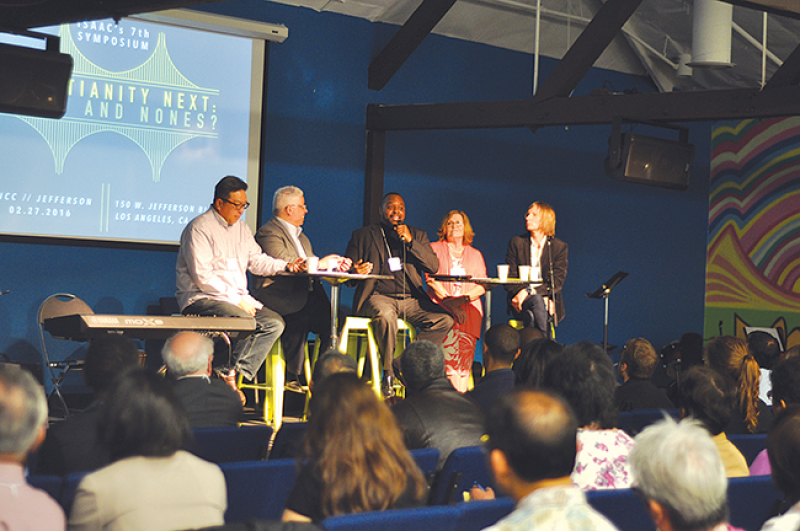
A group of some 80 Christian leaders gathered at Young Nak Celebration Church's Jefferson campus on Saturday to discuss how the church could bring back to church the "dones' and the "nones' -- those who either left the church, or those who say they don't affiliate themselves with any religion.
They gathered for the Institute of Asian American Christianity (ISAAC)'s 7th Symposium, titled, "Christianity Next: the Dones and the Nones?" where Richard Mouw, the president emeritus of Fuller Theological Seminary gave a keynote address, six speakers were featured for a panel, and attendees split into smaller groups to discuss the issues more in detail.
The theme of the symposium came about as a result of Pew Research Center's most recent study that found a decrease in those identifying as Christian and an increase of those who say they are "unaffiliated" with any religion.
Most of those present at the symposium agreed that those "nones' and "dones' must not be condemned, but understood, and that the church as a whole must provide a space for those who have questions about the faith to be able to discuss or explore those questions in a safe environment.
Dr. Richard Mouw argued that though people may call themselves 'atheist' or religiously 'unaffiliated,' "many say they believe in God or that they are spiritual." He pointed to the younger generation's fascination with themes related to the supernatural and the idea of a savior as evidenced by today's entertainment culture, including TV shows or films about zombies, superheroes, or magical powers.
Christians must "exegete the culture," Mouw said, to be able to "point people to Jesus."
Yet, some at the symposium said that the church at times seems to shy away from the culture, or the questions that people may have about how the Christian faith relates to the culture and society.
"I wanted to talk about racial and social justice issues, but I didn't feel comfortable to do so at my church," shared one young woman in her 20s at one of the breakout groups.
Irene Cho, the program manager for the Fuller Youth Institute (FYI), said she was even fired from her church for allowing certain behaviors within her youth group. She shared an example of how many of her youth whom she was pastoring at the time had struggles with smoking cigarettes. She expressed to them that she is against them smoking and encouraged them to quit smoking. But when the youth group went on a retreat, she told them to let her know if they felt they could not win the urge to smoke at the retreat site, and that she would drive them out to a location where they could smoke and come back.
"Isn't it better for them to know that I am walking with them in their struggles, rather than giving them a black and white, yes or no, structure?" Cho asked.
"When I talked with some of them later on, they weren't going to church anymore, but they would tell me, "If I did go back to church, I wish it was like how our youth group was with you,'" she recalled.
Kay Higuera Smith, a professor and director of biblical and religious studies at Azusa Pacific University, touched upon the impact of leaders in the church, and the weight of their position in terms of leading the body. They must be held accountable and even sometimes rebuked when necessary, she said.
One middle-aged woman in Smith's breakout group shared openly about an experience she had in which she was kicked out of her church when she was 23. She said she hadn't felt ready to commit to another church for five years after that experience, due to the betrayal and hurt that she felt.
"When I was 28, I finally felt ready to recommit to a body," she explained, "because I wanted to obey God's word to be a part of the body. I learned not to trust my pastors, but to love them."
"There is a tendency to feel it's sinful to criticize the pastor," Smith said in response, "but they are sometimes the most responsible and must be held accountable when they have done wrong."
Steve Choi, lead pastor of Crossway Community Church, also discussed the importance of having strong and committed leaders in the home and in the church. If there could be a strategy on how to revitalize or reimagine the church, he said he would focus on investing in the family and the church leaders.
Parents spend "18 years discipling the child," Choi said. "Churches and other people may come and go, but parents will always be there."
Yet even within the church, there is a need for committed leadership, he added. "Ministry is tough. It is taxing," Choi said. But if leaders leave the church after short stints, it discredits the message that they preach to the congregation, he explained.
"We need to invest in raising up good leaders in the church -- not just book smart or theologically smart. But really good leaders who are men and women of humility, integrity, who are in it for the long haul."


















